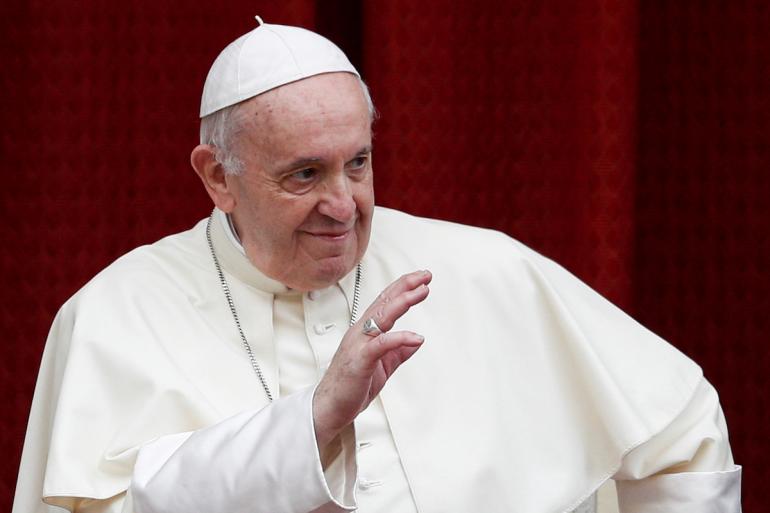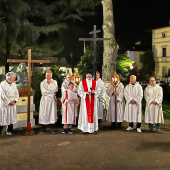Pope Francis stirs controversy with statement on civil union law to cover gay people

Pope Francis’ statement expressing openness to the idea of creating a law that will “legally cover” homosexual people has stirred mixed reactions fuelled by various media interpretations.
The pontiff’s brief comments in the documentary film “Francesco” was reported by several news outlets as departing from the position of the Vatican’s doctrinal office and the pope’s predecessors on the issue.
“The pope’s direct call for civil union laws represents a shift from the perspective of his predecessors, and from his own more circumspect positions on civil unions in the past,” read a report from the Catholic News Agency.
The pope’s latest pronouncement, however, was not a departure from earlier remarks he made about civil union laws that can provide legal protection for couples in long-term, committed relationships.
“Homosexual people have a right to be in a family. They are children of God and have a right to a family,” said Pope Francis in the film that premiered in Rome on October 21.
“Nobody should be thrown out or be made miserable over it. What we have to create is a civil union law. That way they are legally covered,” he said.
In previous pronouncements, the pontiff had repeatedly said that parents should not and must not disown a child who is gay, and, on several occasions, he spoke about the rights all people have to have a family.
In a 2019 interview, the pope said he “always defended doctrine,” referring to marriage, adding that it is “a contradiction to speak of homosexual marriage.”
Confused reactions
In predominantly Catholic Philippines, several church leaders issued conflicting reactions to the pope’s pronouncement that was widely reported in the media.
Bishop Arturo Bastes, retired prelate of Sorsogon, described it as a “shocking statement” that is “contrary to divine law, which explicitly permits only the union of man and woman” whether the union is “civil, legal or sacramental.”
“This pope has the penchant of changing Catholic doctrines, which are considered heretical in the past by his predecessors,” said Bishop Bastes, adding that he has “very serious doubts about the moral correctness of this latest statement of Pope Francis.”
Bishop Bastes warned that the statement might sow “confusion” among the faithful. He said was “really scandalized by his defense of homosexual union, which surely leads to immoral acts.”
“Accepting legal civil union for [homosexual persons] is objectively tolerating something against nature and norms of morality on sexuality,” said Bishop Pedro Arigo, retired prelate of Puerto Princesa.
He described it as “a dangerous radical shift on former perspective” and “confusing,” especially on how to handle sex scandals in the Church involving gay members of the clergy.
“Homosexuals though are not judged as sinners. Only God knows. Church teachings say it’s an abnormality and should not act on it,” said Bishop Arigo.
“What the pope said about legal civil union is his personal opinion and not an official teaching of the Church,” he said.
Putting the statement in context
Bishop Gerardo Alminaza of San Carlos said the pope’s statement should be taken in context and in the light of what he said in previous occasions.
The prelate said Pope Francis has made it clear in his previous pronouncement that he upholds Church teachings on human sexuality, marriage and family.
“Is it wrong for the pope to defend [homosexuals persons’] need to belong to a family who will support them, to be accepted, loved and not to be discriminated or rejected?” said Bishop Alminaza.
“His motive: ‘They’re children of God and have a right to a family.’ Who can contest that?” added the bishop, adding that Pope Francis has been consistent in his statements from his encyclical “Amoris laetitia” to “Fratelli tutti.”
“What is problematic is when we interpret the pope out of context,” said Bishop Alminaza.
“We can’t accused him of deviating from the official teachings of the Church on the basis of a short, edited statement without hearing the fuller context and explanation,” he said.
“Taken as part of his sincere pastoral accompaniment of persons with homosexual orientation, the pope seems to suggest that they too need to be protected by law so they are not unjustly, unfairly discriminated against on the basis of their sexual orientation alone,” added the prelate from the central Philippines.
“I think it’s too much of a stretch of interpretation to jump into conclusion from this statement alone that the pope is endorsing ‘same sex marriage’ or is therefore changing the doctrine of the Church,” Bishop Alminaza said.
Several Catholic bishops chose not to comment on the issue.
“I cannot comment on the documentary because I do not know it,” said Bishop Broderick Pabillo, apostolic administrator of the Archdiocese of Manila.
“I refrain from making comment on this because I need to see and know the context,” said Bishop Jose Colin Bagaforo of Kidapawan.
“I have to see the context of his remarks and when he made them and to see what he was referring to,” said Bishop Teodoro Bacani, retired prelate of Novaliches.
Blaming the media
Bishop Joel Baylon of Legazpi said the pontiff might have been “misinterpreted,” adding that he would withhold his statement until an official Vatican statement is issued.
“As it happened in the past, [the pope’s] words are often misinterpreted by the media,” said Bishop Baylon.
Bishop Crispin Varquez of Borongan said the media “misunderstood Pope Francis.”
Father Roy Cimagala, who writes opinion pieces for several publications, said the news about the pope’s statement is “another case of journalistic reporting that certainly fails to consider all aspects of the statement.”
“Such reporting usually treats such statements at face value and hardly goes any further. It’s not done with much depth, and so it has to be taken with a grain of salt,” said the priest.
“It’s a statement that is not given by the pope ‘ex cathedra.’ It’s more his personal opinion, although of course even his opinions should be taken seriously. It’s not subject to the infallibility rule,” said the priest.
Father Cimagala said the public “have to feel at home with the reality that popes can have opinions with which we may not be in agreement.”
“And they can be wrong in their personal opinions,” he said. “We should not be surprised by that.”
“Try to imagine Saint Peter with all his impulsiveness. I am quite certain that even if he was guided by the Holy Spirit, he was not totally freed of weaknesses and even mistakes in his views and actuations,” said the priest.
“Remember that he was corrected by Saint Paul. And in the history of the papacy, we have popes with scandalous lives, but who did not compromise the integrity of what belongs to Christian faith and morals.”
“It’s clear that the pope’s intention is good, that is, to be more charitably accommodating with those in some irregular situation if only to maintain a good relationship with them in spite of our big-time conflicts,” added Father Cimagala.
The priest, however, said that “in our differences and conflicts with the pope and with anybody, charity should never be lost even if we are sure the other party is totally wrong.”
“Some legal recognition of same sex unions may be tolerated while not approved if only to achieve a greater good, maintain good relation with people in irregular situations for the sake of charity and the possibility of conversion,” he told LiCAS.news.
Welcomed by LGBTQ+ groups
Gay rights groups in the Philippines lauded the pontiff’s “bold statement.”
“We are happy. It’s a baby step but it is a great step toward the full acceptance of the LGBTQIA+ community within the Catholic community,” said Reyel Xavier Inocencio.
“We assume and hope that more Christians and Catholics alike will adopt the belief of the pope — that even same sex couples have the right to a family,” he said.
Members of activist group Bahaghari said they believe in genuine marriage equality without any boundaries for gender and welcome the pope’s pronouncement.
They are also hoping that the Philippine government will embody the Pope’s empathy for the LGBTQ+ by making concrete measures to recognize their union under the law.
“Perhaps the Philippine government, which prides itself as a staunchly Catholic state, wants to take notes from the head of the Catholic Church himself?” read a statement from Bahaghari.
Gay political party Ladlad said that while it does not alter Church dogma, the pope’s statement “provides a legal way for LGBTQI couples to form their own families.”
“As this terrible pandemic has shown, what matters in the end is companionship and love,” said Professor Danton Remoto, chairman of Ladlad.
‘Francesco’
The Vatican this week announced the release of “Francesco,” a new documentary on the life and teaching of Pope Francis that tells the story of Jorge Mario Bergoglio.
The film, directed by Evgeny Afineevsky, tackles some of the main themes of the pope’s pontificate through a series of interviews that are interwoven with stories from past.
It includes exclusive interviews with Pope Francis himself, with Pope Emeritus Benedict XVI, with members of the pope’s family, among others.
The film also highlights the “challenges of our time,” the urgencies that need answering and the mission of the Church in looking after those who suffer injustices.
A communiqué presenting the movie said Pope Francis answered questions “with wisdom and generosity” sharing “moving examples of his life lessons,” relaunching ideals that “can help us build a bridge to a better future and grow as a global community.”
The film premiered in Rome on October 21 at the Rome Film Festival in the Special Events Section.
On Thursday, October 22, it was shown in the Vatican Gardens and will receive the 18th Kinéo Prize for promoting social and humanitarian themes.
Reported by Joe Torres, Mark Saludes, Ronald Reyes, and Jaimie Aberia for LiCAS News.
Radio Veritas Asia (RVA), a media platform of the Catholic Church, aims to share Christ. RVA started in 1969 as a continental Catholic radio station to serve Asian countries in their respective local language, thus earning the tag “the Voice of Asian Christianity.” Responding to the emerging context, RVA embraced media platforms to connect with the global Asian audience via its 21 language websites and various social media platforms.












